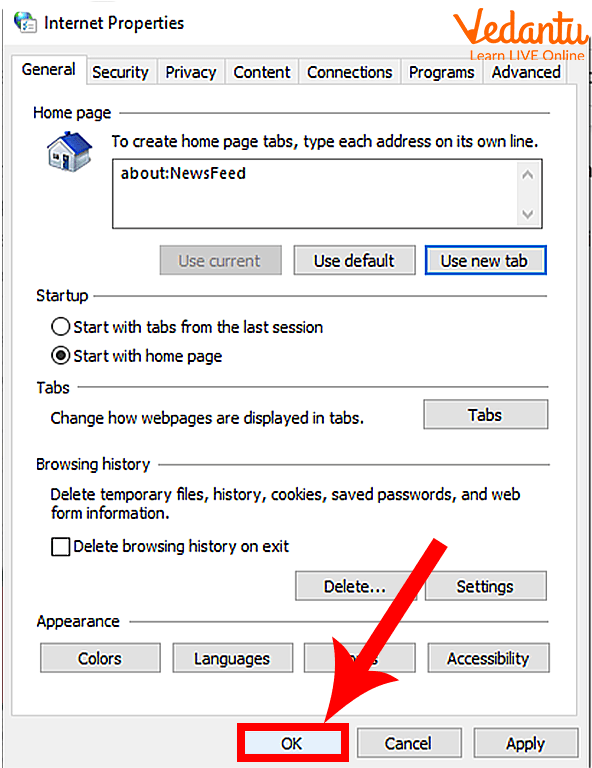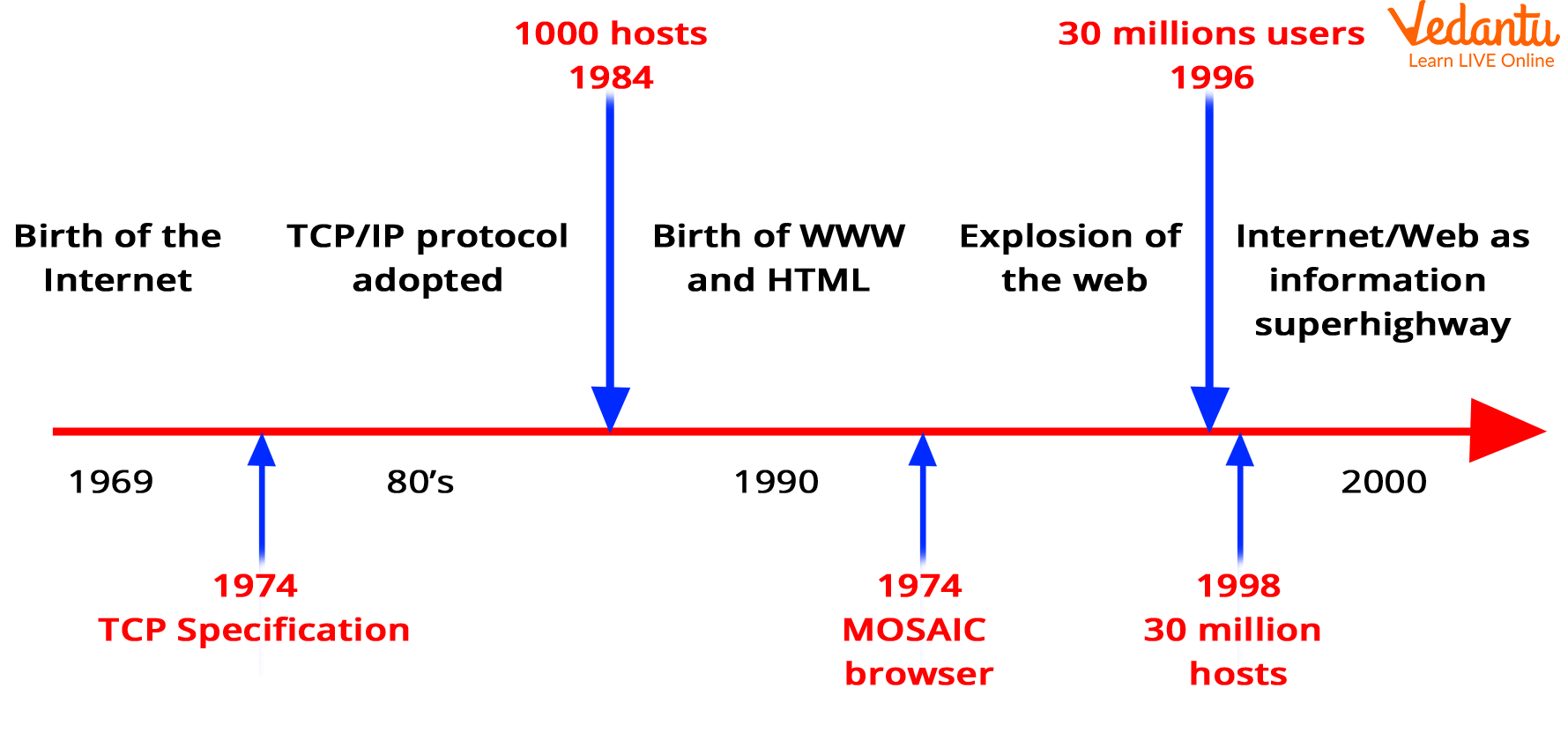




Introduction
The internet originated back in the 1970s; Bob Kahn and Vint Cerf created the Internet. On January 1, 1983, the Defence Data Network and ARPANET switched formally to the TCP/IP protocol, resulting in the creation of the Internet. Now, a single global language might link all networks.
Starting the internet on your PC requires only one simple action. It is done when we double-click the Google Chrome icon or any other search engine on the desktop; the machine gets online. Or click on Start -> Programs -> Internet Explorer as the next step.
We will learn everything about the internet in this article - from how to start using the internet, to its history, and other important things.
Steps to Start Using the Internet
You must dial up a connection to the computer of your access provider if your computer is not always online.
Follow these steps to achieve this:
On the desktop, double-click the "My Connection" icon. There will be a "Connect To" dialogue box.
Select "Connect" from the menu. The modem will make some noises, and a new dialogue box that requests the user name and password will appear on the screen.
The "Continue Button" on the dialogue box should be clicked after entering the username and password.
The Internet will begin in a few minutes when a minimised symbol appears in the bottom right corner of the screen.

Start Internet
History of the Internet
In the 1960s, research into what was then known as packet switching gave birth to the Internet. It was believed that packet switching would be a better and faster way to convey data than the hardware option, which was the circuits. The United States Military's development of ARPANET required packet-switching technology.
The ARPANET is regarded as the earliest known network of connected computers or the internet. The military used this technique to exchange private information. Then, this data-sharing technology was made available to American educational institutions so they could use the government's supercomputer, initially at 56 kbit/s, then at 1.5 Mbit/s, and finally at 45 Mbit/s.
In the US, the internet was completely commercialised by 1995, and internet service providers started to appear in the late 1980s.

Internet History
Evolution of the Internet
The Internet has gone a long way in a short time, from its early days as a network restricted to the military to its current position as one of the developed world's main sources of information and communication. However, a few features haven't changed and offer a logical thread for understanding the beginnings of the now-dominant media. The first is the ongoing existence of the Internet, whose design as a decentralised, unbreakable communication network was inextricably influenced by its Cold War origins.
The second component is the creation of computer communication rules that allow the machines to transform unprocessed data into insightful knowledge. These guidelines, or protocols, were created by computer scientists after much deliberation in order to enable and regulate online communication and shape the way the Internet functions. Facebook is a straightforward illustration of a protocol: Users can easily interact with one another, but only if they accept protocols like wall posts, comments, and messages. Facebook's protocols enable communication while also regulating it.
These two components link the history of the Internet to its current form.

Evolution of the Internet
Sample Questions
1. What is the name of the largest computer network?
Ans: The Internet is the largest computer network in the world, a global network that links millions of enterprises, governmental organisations, and educational institutions.
2. Where can you use the Internet?
Ans: A computer, smartphone, PDA, gaming console, digital TV, etc., can all be used to access the Internet. Over two-thirds of the populace generally uses the internet in wealthier nations. However, despite being significantly lower, usage rates are rising in the poor world.
Learning by Doing
1. When your computer is permanently linked to the Internet, which of the following should you do first to start the Internet?
Start-> Programs-internet Explorer
Start -> Internet Explorer-> Programs
Internet Explorer-> Start->Programs
Internet Explorer-> Programs-> Start
None of these
Ans: Correct Choice is (A) When your computer is permanently linked to the Internet, the proper order to launch the Internet is Programs -> Internet Explorer under Start
2. You must first _________ if your computer is not always connected to the Internet.
Give your username.
Dial up a connection to the computer of your access provider.
Give your password.
None of these.
All of these.
Ans: Correct Choice is (B) You must dial up a connection to the computer of your access provider if your computer is not always linked to the Internet.
Summary
A system for creating wireless, wired, and cable connections between any two computers anywhere in the world is the Internet, also referred to as "the net." If your computer is not always online, you must dial up a connection to your access provider's computer.
The Internet evolved from the Cold War to the Facebook era. We can download movies, music, videos, games, photographs, and files from the internet.
FAQs on Starting the Internet
1. What is the Internet and what makes it the world's largest computer network?
The Internet is a massive, global system of interconnected computer networks that use the standard Internet protocol suite (TCP/IP) to communicate with each other. It is considered the world's largest network because it links billions of devices worldwide, including private, public, academic, business, and government networks, allowing for the seamless exchange of data and resources.
2. What are the modern steps to connect to and start using the Internet on a device?
To connect a modern device like a computer or smartphone to the Internet, you typically follow these steps:
- Choose a connection method: Connect to a Wi-Fi network by selecting its name (SSID) and entering the password, or plug an Ethernet cable directly from your router to your device for a wired connection.
- Verify the connection: Your device will indicate it is connected to the network.
- Open a web browser: Launch an application like Google Chrome, Firefox, or Safari. This browser allows you to access websites and begin using the Internet.
3. When is the official birthday of the Internet and why is that date significant?
The official birthday of the Internet is widely considered to be January 1, 1983. This date is significant because it was the deadline when the ARPANET (the precursor to the Internet) and the Defense Data Network formally switched to the TCP/IP protocols. This switch created a single, unified language for different computer networks to communicate, marking the true beginning of the interconnected 'network of networks' we know today.
4. How did the Internet evolve from its predecessor, ARPANET?
The Internet evolved from ARPANET (Advanced Research Projects Agency Network), which was a project funded by the U.S. military in the 1960s. The key transition involved a shift from a closed, government-controlled network for military and academic use to an open, global system. This evolution was driven by the adoption of TCP/IP, which allowed diverse networks to interconnect, and the commercialisation of the network in the 1990s, opening it up to the public and businesses.
5. What is the crucial difference between the Internet and the World Wide Web (WWW)?
The crucial difference is that the Internet is the global hardware and software infrastructure (the physical network of wires, cables, routers, and servers), while the World Wide Web (WWW) is an information service that runs on top of the Internet. The WWW is a system of interlinked documents and resources, accessed via web browsers using protocols like HTTP. An analogy is to think of the Internet as the roads and the WWW as the houses and shops you can visit using those roads.
6. Why was the standardisation of the TCP/IP protocol essential for creating the modern Internet?
The standardisation of TCP/IP (Transmission Control Protocol/Internet Protocol) was essential because it created a universal 'language' for data communication. Before TCP/IP, different computer networks had their own proprietary protocols and could not easily communicate with each other. TCP/IP established a common set of rules for how data should be packaged, addressed, sent, and received, allowing any network, regardless of its underlying technology, to connect and exchange information reliably. This interoperability is what enabled the creation of a single, global Internet.
7. How did the Internet's initial design for military purposes influence its current structure?
The Internet's design was heavily influenced by its military origins, specifically the need for a communication network that could survive a nuclear attack. This led to the creation of a decentralised network architecture. Unlike a centralised system with a single point of failure, data on the Internet can travel through multiple paths. This inherent redundancy makes the network incredibly robust and resilient, a core feature that defines its structure and reliability today.
8. On what common devices can we access the Internet today?
Today, you can access the Internet on a wide variety of devices beyond the traditional desktop computer. Common examples include:
- Computers (desktops, laptops)
- Smartphones and Tablets
- Smart TVs
- Gaming Consoles (like PlayStation and Xbox)
- Wearable technology (like smartwatches)
- Internet of Things (IoT) devices (like smart home assistants and appliances)
9. When did the Internet become commercially available for homes?
While the Internet's foundations were laid in the 1960s and 70s, it started becoming commercially available to homes in the late 1980s with the emergence of the first Internet Service Providers (ISPs). However, it wasn't until the mid-1990s, with the rise of the World Wide Web and user-friendly web browsers, that home internet use became widespread and was fully commercialised in many parts of the world.











